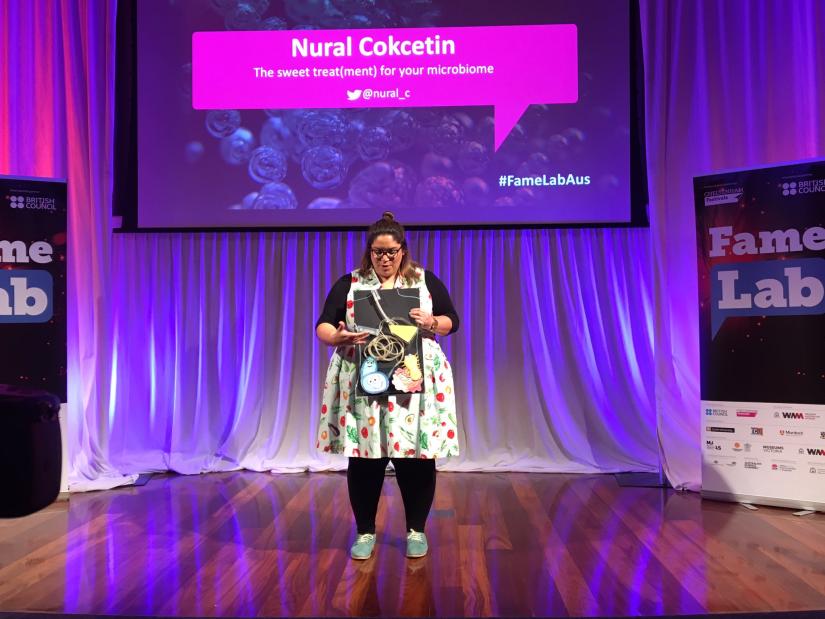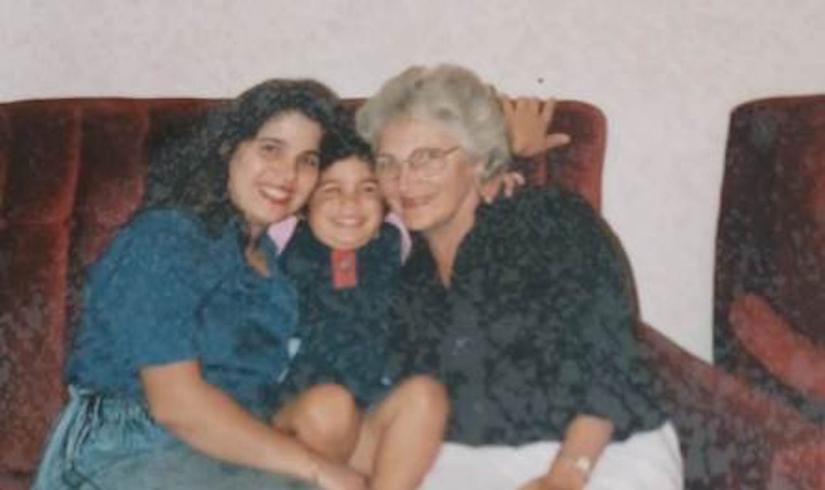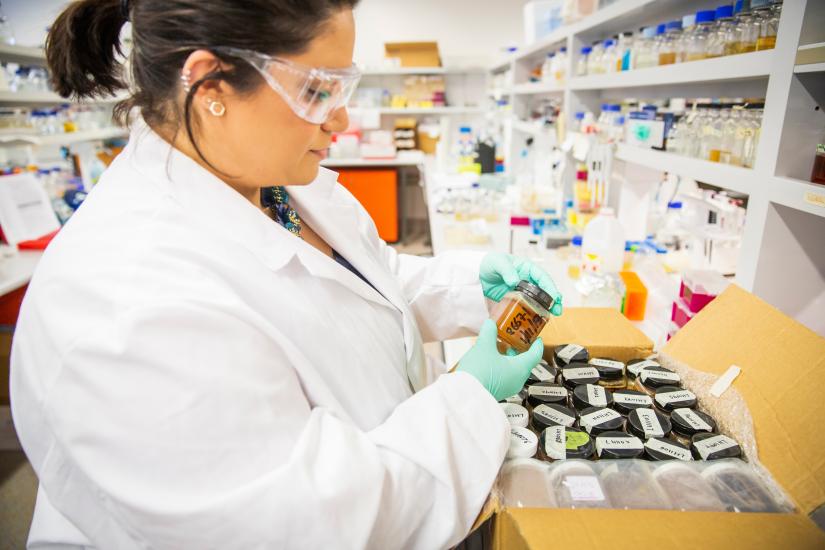Dr Nural Cokcetin’s story
Read Dr Nural Cokcetin’s speech at the Say My Name campaign launch.
Nural’s journey of honouring her unique name
It’s not uncommon for me to tell people my name and hear:
“Wow! What an unusual name!” and “Where is it from?” And one of my favourites “Now that’s not a name you hear every day”. Actually, I do hear it every day… since the day I was born, and often I hear and respond to many iterations of this name multiple times a day.
Thank you, Elaine, for the introduction but I will start with a confession – that’s not actually how you say my name. Nural Cokcetin is the anglicised version of my name that I use to make it easier to pronounce.

Nural at the FameLab Science Communication Competition where she won the Australian ‘Best Young Science Communicator’ and ‘Audience Choice’ Award.
My name is of Turkish origin – my first name NURAL is made up of the words NUR (noor) – light, and AL (aal) – to take and it’s not a traditional Turkish name. It’s made up of half my mum’s and half my dad’s name, my dad reckons he came up with it to honour his mother who also had NUR as part of her name. My mum’s version of the story is that she liked the name because it sounded a bit like the Turkish version of Narelle and Narelle was my mum’s English tutor when she first moved to Australia– and who stayed a close family friend for many years, and I referred to her as my ‘grandma’ until she moved away around the time I was starting school. My last name, ÇOKÇETIN, is rooted in the words ÇOK (chock) meaning very and ÇETIN (cheh-tin) meaning brave, but when it comes to saying my name the truth is I am anything BUT very brave.

Nural with her mother and Narelle
I guess I never really thought about how my name was said until I started school. In kindy, my teacher had a bit of a hard time pronouncing my name, but we had a teacher’s aide who was Turkish and would say my name properly and frequently. My kindy teacher quickly adopted a version of my name – Nural (new-raal) – that was easy for her and my classmates to say, so I guess that’s the origin of how my name in English became Nural and how I started introducing myself to new teachers and new friends. Most of my teachers throughout primary school struggled to say my name and I was a shy and quiet kid, so after trying to correct my name once maybe twice, I just stayed quiet, allowing others to mispronounce my name because I didn’t want them to feel uncomfortable or to draw so much attention to how different or difficult my name was.
In year 2, I sat next to another girl with a ‘tricky’ name and we became friends, chatting away in class while we did our work. When it came to report time, I got the first negative feedback I’d ever received – Nural is very talkative in class. My dad was furious and I was terrified about what my teacher would say in the parent teacher interviews the following week. At the meeting, my teacher only had very positive things to say and at the end, my dad frustratedly asked “well why did you write this in her report”. My teacher read the talkative comment and said “oh, that wasn’t about her. I must have gotten mixed up. It was about the girl sitting next to her”. So, after months of being my teacher not only did she not know my name, but she simply substituted one ‘tricky’ name for another, even though they sounded nothing alike.
My year 5 teacher, Ms Campbell, was the best though! She never got my name wrong – and not just my first name. She never got my last name wrong either! In class we had a teacher’s helper roster where the class took turns with tasks like going to get the lunch orders from the canteen, sharpen the pencils, help with roll call, that kind of thing. When it was my turn on the roster, I saw Ms Campbell’s notes on the roll call list and read the one next to my name – ‘new-raal’ ‘like chocolate-tin but ch instead of L’ – and that was her secret to always getting my name right.
Most angst around my name was centred around events like winning awards, graduation – the things people normally feel accomplished and proud about filled me with dread and anxiety...
It got a lot better in high school – perhaps because I was a little bit less shy, a bit more confident to correct people more than once and because it seemed like there were heaps of others with diverse names – including the teachers. Most of the angst around my name was centred around events like winning awards, graduation – the things people normally feel accomplished and proud about filled me with dread and anxiety around what my name would sound like when the person reading it out loud couldn’t say it right. Of course, you try and laugh it off or dramatically roll your eyes when your friends laugh about how that person ‘butchered your name’, but it stays with you as a constant source of embarrassment and even shame.
I want to say it’s so much better now as an adult and in a professional setting – but it’s really not, and I feel that I’m much less tolerant to the REPEAT mistakes as I get older. It’s frustrating and humiliating to correct someone once, twice and even three times – to provide phonetic spelling and audio and prompts just before you’re introduced and still hear my name so grossly mispronounced.
Without realising it, over time I have let other redefine and undermine a primary marker of my identity, my heritage, and my cultural background.

Dr Nural Cokcetin looking through honey samples to test their antibacterial properties
When I first joined UTS, I was running a research project where we were sent honey samples from around Australia for testing. These came to our Science Store in our building so I was down there almost every day and always greeted with “hi new-rool, more honey samples for you”, to which I would reply “thanks! It’s actually nuraaal”. It never stuck. I found myself talking in third person, calling out “nural’s here to pick up her honey samples” – and after a couple of weeks of that, I just got back “you don’t have to keep saying who you are, I know you new-rool!” I picked up over a thousand honey samples over three years from this colleague, and not one of those times did she ever say my name right. I’ve been invited to give over 100 industry and government talks, public lectures and media appearances in the past few years and I’ve now heard countless times, “I’m not even going to attempt to pronounce your name, because I know I’ll get it wrong” or “Sorry, I’ve forgotten how to say your name right” – but how do you hear anything but “you’ve just told me your name and I don’t really want to learn how to say it”. The solution shouldn’t be “no problem, I’m happy to introduce myself”, right? Without realising it, over time I have let others redefine and undermine a primary marker of my identity, my heritage, and my cultural background.
I realised then that the round table introductions that I was always so worried about – it wasn’t my fun (or un-fun) fact about myself. It was that I always stumbled at the first hurdle - ‘Hi, I’m Nural Cokcetin.’
One of the things I hate the most and causes me most grief – especially in a work setting – are those ‘ice-breakers’ where you go around the table and introduce yourself and share a fun fact. I never really thought about why that caused me so much stress… assuming probably that it was cos I was boring and could never think of a fun fact to share about myself. A few weeks ago, I was chatting to my sister and cousins about talking at this very event, lamenting about how all four of us have the really ‘tricky’ non-anglo names, and my cousin said something that really struck a chord. “It’s no wonder I find it so hard to make friends as an adult”, she said. “I hate introducing myself, I hate saying my name out loud, then having to repeat it so many times and still no one ever gets it. It’s why I always come off as stand-offish, I just hate saying my name”. I realised then that the round table introductions that I was always so worried about – it wasn’t my fun (or even un-fun) fact about myself. It was that I always stumbled at the first hurdle – “hi, I’m Nural Cokcetin”.
It’s not all bad news though. Sometimes it pays to have such a unique name. If you were to smash into the keyboard any combination of letters that slightly resembles those in my name, along with ‘microbiologist’ or ‘honey’ or ‘bees’ – you’re guaranteed to track me down. Nural Cokcetin at gmail or outlook dot com – hiiiighly likely to be available for me to use.
Maybe we need to take a closer look at our learned behaviours, biases and microaggressions. Maybe what is much harder is to unlearn our bias and put in just a bit more effort
And I’ll end my story with this. A few months ago, I was playing with my friend’s three-year-old and without thinking I found myself saying “do you want to find a nickname for me? My name is a bit tricky to say, isn’t it?” her immediate response? “No. Nural. See? It’s easy!” So maybe it’s not that hard to say my name after all – maybe we need to take a closer look at our learned behaviours, biases and microaggressions. Maybe what is much harder is to unlearn our bias and put in just a bit more effort, like Ms Campbell did in Year 5.
